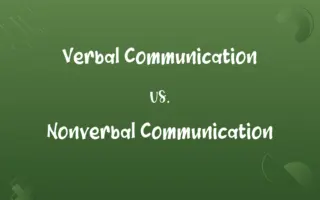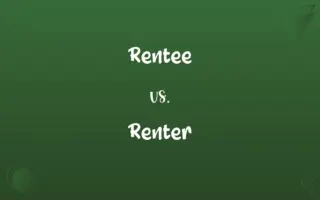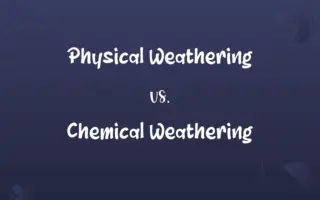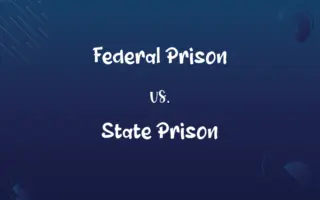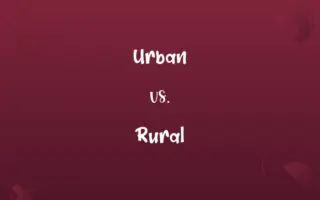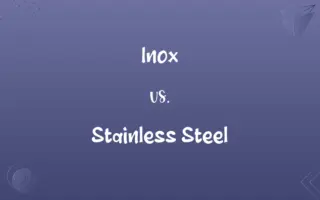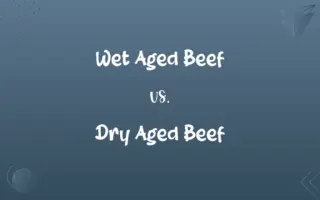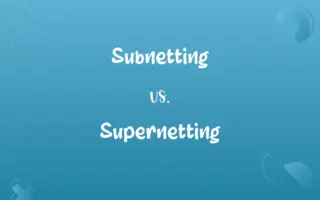Railway vs. Railroad: Know the Difference

By Shumaila Saeed || Updated on December 25, 2023
Both terms refer to the system of tracks, trains, and associated infrastructure, with "railway" more common in British English and "railroad" in American English.
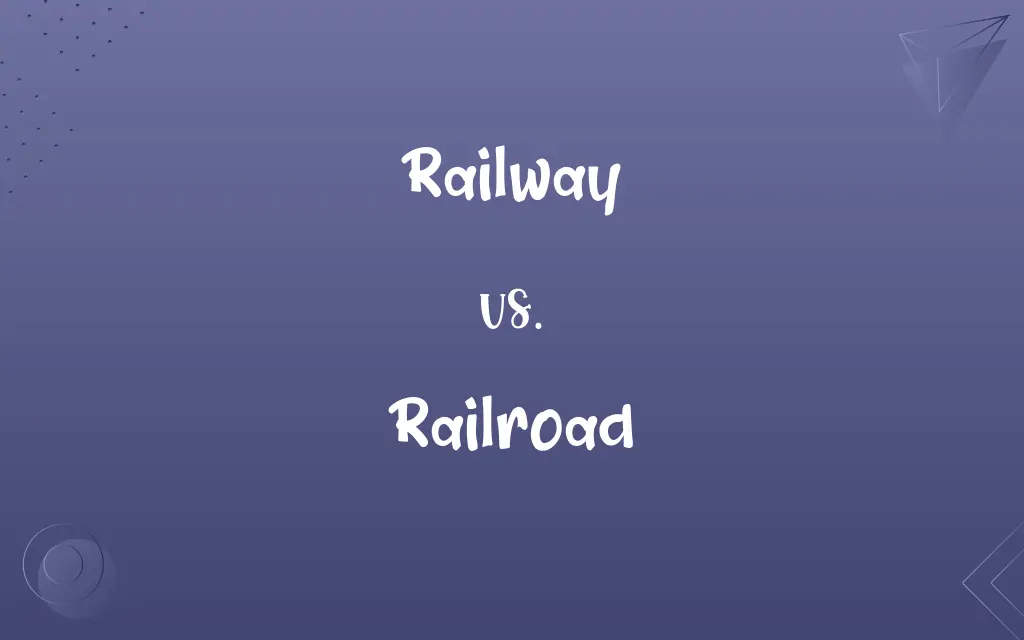
Key Differences
Railways and railroads both consist of a system of fixed tracks where trains operate. The terms are often used interchangeably, but there are regional preferences.
Shumaila Saeed
Nov 08, 2023
"Railway" is the term more commonly used in the UK and many other parts of the world to describe the overall system and infrastructure for trains. "Railroad" is the preferred term in the United States and Canada.
Shumaila Saeed
Nov 08, 2023
Each railway or railroad includes tracks, signals, stations, and rolling stock. However, railway tends to connote a more complex network with passenger and freight services, while railroad often implies a focus on heavy freight in North American usage.
Shumaila Saeed
Nov 08, 2023
Railways are integral to the transportation infrastructure in many countries, providing vital links for both passengers and freight. Railroads have played a significant role in the expansion and economic development of North America, often associated with the iconic image of the locomotive 'conquering the West'.
Shumaila Saeed
Nov 08, 2023
Despite the regional differences, the function of railways and railroads remains the same: to provide an efficient and reliable mode of land transportation.
Shumaila Saeed
Nov 08, 2023
ADVERTISEMENT
Comparison Chart
Regional Usage
Preferred in the UK and others
Preferred in the USA and Canada
Shumaila Saeed
Nov 08, 2023
Association
Both freight and passenger travel
Often associated more with freight
Shumaila Saeed
Nov 08, 2023
Historical Context
Prominent in colonial expansion
Iconic in American westward expansion
Shumaila Saeed
Nov 08, 2023
Term Usage
Part of phrases like "railway station"
Part of phrases like "railroad crossing"
Shumaila Saeed
Nov 08, 2023
Infrastructure
Implies a complex network
Suggests a more robust, heavy-duty construction
Shumaila Saeed
Nov 08, 2023
ADVERTISEMENT
Railway and Railroad Definitions
Railway
The organizational structure that controls train operations.
He works for the national railway company.
Shumaila Saeed
Nov 08, 2023
Railroad
The corporations that run freight and passenger trains.
She works for a major railroad company.
Shumaila Saeed
Nov 08, 2023
Railway
The entirety of trains, tracks, stations, and services.
The railway system has been upgraded.
Shumaila Saeed
Nov 08, 2023
Railroad
The physical tracks and infrastructure for train travel.
The new railroad track makes travel quicker.
Shumaila Saeed
Nov 08, 2023
Railway
A track system for the operation of train services.
The railway connects two major cities.
Shumaila Saeed
Nov 08, 2023
ADVERTISEMENT
Railroad
An American term for the train industry.
The railroad industry has a rich history.
Shumaila Saeed
Nov 08, 2023
Railway
An industry that deals with train transportation.
The railway industry is pivotal to the economy.
Shumaila Saeed
Nov 08, 2023
Railroad
Sometimes used as a verb meaning to rush or coerce.
He felt railroaded into the decision.
Shumaila Saeed
Nov 08, 2023
Railway
Used in British English to denote train-related activities.
Railway timetables are available at the station.
Shumaila Saeed
Nov 08, 2023
Railroad
A system of tracks for the operation of trains in North America.
The railroad was fundamental to the USA's development.
Shumaila Saeed
Nov 08, 2023
Railway
A railroad, especially one operated over a limited area
A commuter railway.
Shumaila Saeed
Oct 19, 2023
Railroad
A road composed of parallel steel rails supported by ties and providing a track for locomotive-drawn trains or other wheeled vehicles.
Shumaila Saeed
Oct 19, 2023
Railroad
A system of railroad track, together with the land, stations, rolling stock, and other related property under one management.
Shumaila Saeed
Oct 19, 2023
Railway
A track, consisting of parallel rails, over which wheeled vehicles such as trains may travel.
Shumaila Saeed
Oct 19, 2023
Railway
Line that is the commercial organization responsible for operating a railway system
Shumaila Saeed
Oct 19, 2023
Railroad
To rush or push (something) through quickly in order to prevent careful consideration and possible criticism or obstruction
Railroad a special-interest bill through Congress.
Shumaila Saeed
Oct 19, 2023
Railway
A line of track providing a runway for wheels;
He walked along the railroad track
Shumaila Saeed
Oct 19, 2023
Railroad
To convict (an accused person) without a fair trial or on trumped-up charges.
Shumaila Saeed
Oct 19, 2023
Railroad
A permanent track consisting of fixed metal rails to drive trains or similar motorized vehicles on.
Many railroads roughly follow the trace of older land - and/or water roads
Shumaila Saeed
Oct 19, 2023
Railroad
The transportation system comprising such tracks and vehicles fitted to travel on the rails, usually with several vehicles connected together in a train.
Shumaila Saeed
Oct 19, 2023
Railroad
A single, privately or publicly owned property comprising one or more such tracks and usually associated assets
Railroads can only compete fully if their tracks are technically compatible with and linked to each-other
Shumaila Saeed
Oct 19, 2023
Railroad
(figuratively) A procedure conducted in haste without due consideration.
The lawyers made the procedure a railroad to get the signatures they needed.
Shumaila Saeed
Oct 19, 2023
Railroad
(intransitive) To operate a railroad.
The Thatcherite experiment proved the private sector can railroad as inefficiently as a state monopoly
Shumaila Saeed
Oct 19, 2023
Railroad
(transitive) To manipulate and hasten a procedure, as of formal approval of a law or resolution.
The majority railroaded the bill through parliament, without the customary expert studies which would delay it till after the elections.
Shumaila Saeed
Oct 19, 2023
Railroad
(transitive) To convict of a crime by circumventing due process.
They could only convict him by railroading him on suspect drug-possession charges.
Shumaila Saeed
Oct 19, 2023
Railroad
(transitive) To procedurally bully someone into an unfair agreement.
He was railroaded into signing a non-disclosure agreement at his exit interview.
Shumaila Saeed
Oct 19, 2023
Railroad
(role-playing games) To force characters to complete a task before allowing the plot to continue.
Shumaila Saeed
Oct 19, 2023
Railroad
(upholstery) To run fabric horizontally instead of the usual vertically.
Shumaila Saeed
Oct 19, 2023
Railroad
A road or way consisting of one or more parallel series of iron or steel rails, patterned and adjusted to be tracks for the wheels of vehicles, and suitably supported on a bed or substructure.
Shumaila Saeed
Oct 19, 2023
Railroad
The road, track, etc., with all the lands, buildings, rolling stock, franchises, etc., pertaining to them and constituting one property; as, a certain railroad has been put into the hands of a receiver.
Shumaila Saeed
Oct 19, 2023
Railroad
To carry or send by railroad; usually fig., to send or put through at high speed or in great haste; to hurry or rush unduly; as, to railroad a bill through Condress.
Shumaila Saeed
Oct 19, 2023
Railroad
Line that is the commercial organization responsible for operating a railway system
Shumaila Saeed
Oct 19, 2023
Railroad
A line of track providing a runway for wheels;
He walked along the railroad track
Shumaila Saeed
Oct 19, 2023
Railroad
Compel by coercion, threats, or crude means;
They sandbagged him to make dinner for everyone
Shumaila Saeed
Oct 19, 2023
Repeatedly Asked Queries
Can the terms railway and railroad be used interchangeably?
They can be, but regional preferences often determine usage.
Shumaila Saeed
Nov 08, 2023
Is "railroad" used in the UK?
It's understood but not commonly used; "railway" is preferred.
Shumaila Saeed
Nov 08, 2023
What is a railway?
A railway is a system of transportation using trains on fixed tracks, typically found outside of North America.
Shumaila Saeed
Nov 08, 2023
Are railways and railroads the same?
Functionally, yes, but there are regional differences in usage.
Shumaila Saeed
Nov 08, 2023
Do railways only carry passengers?
No, they carry both passengers and freight.
Shumaila Saeed
Nov 08, 2023
Who operates railroads?
Railroads are operated by railroad companies that may be privately or publicly held.
Shumaila Saeed
Nov 08, 2023
What is a railroad?
A railroad is the North American term for a system of transportation using trains on tracks, often emphasizing freight transport.
Shumaila Saeed
Nov 08, 2023
Why is "railroad" more common in American English?
It's historically entrenched and differentiates from British English.
Shumaila Saeed
Nov 08, 2023
Do railroads only carry freight?
No, they also carry passengers, especially in commuter services.
Shumaila Saeed
Nov 08, 2023
What's a "railroad crossing"?
A railroad crossing is a place where a railroad track intersects with a road at the same level.
Shumaila Saeed
Nov 08, 2023
What's a "railway station"?
A railway station is a designated stop where trains load and unload passengers or freight.
Shumaila Saeed
Nov 08, 2023
Is infrastructure the same for railways and railroads?
Yes, both include tracks, signals, stations, and rolling stock.
Shumaila Saeed
Nov 08, 2023
Are railways more environmentally friendly than road transport?
Generally, yes, due to their efficiency and lower emissions per ton-mile.
Shumaila Saeed
Nov 08, 2023
Who operates railways?
Railways are operated by organizations that can be private, public, or state-owned.
Shumaila Saeed
Nov 08, 2023
Are railroads a part of public transportation?
In many cities, yes, they are integral to the public transportation system.
Shumaila Saeed
Nov 08, 2023
Can you travel internationally on a railway?
In some regions, such as Europe and Asia, international train travel is common.
Shumaila Saeed
Nov 08, 2023
Do all countries have railroads?
Not all, but most industrialized nations have some form of railroad infrastructure.
Shumaila Saeed
Nov 08, 2023
What is the significance of railways in history?
Railways were crucial in the industrial and economic development of many countries.
Shumaila Saeed
Nov 08, 2023
What is the significance of railroads in American history?
Railroads were central to the westward expansion and economic growth of the USA.
Shumaila Saeed
Nov 08, 2023
How are railway and railroad networks powered?
They can be powered by diesel, electricity, or a combination of both.
Shumaila Saeed
Nov 08, 2023
Share this page
Link for your blog / website
HTML
Link to share via messenger
About Author
Written by
Shumaila SaeedShumaila Saeed, an expert content creator with 6 years of experience, specializes in distilling complex topics into easily digestible comparisons, shining a light on the nuances that both inform and educate readers with clarity and accuracy.



